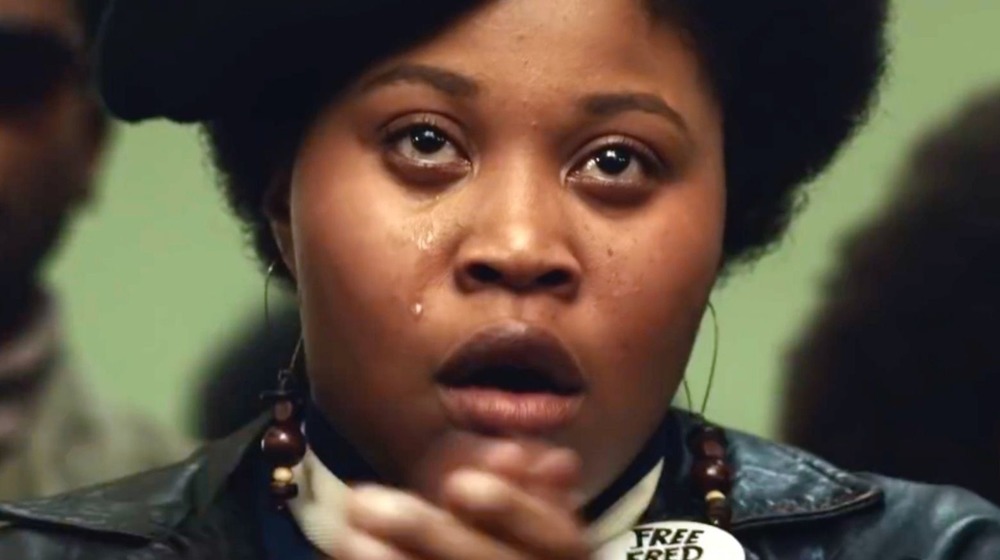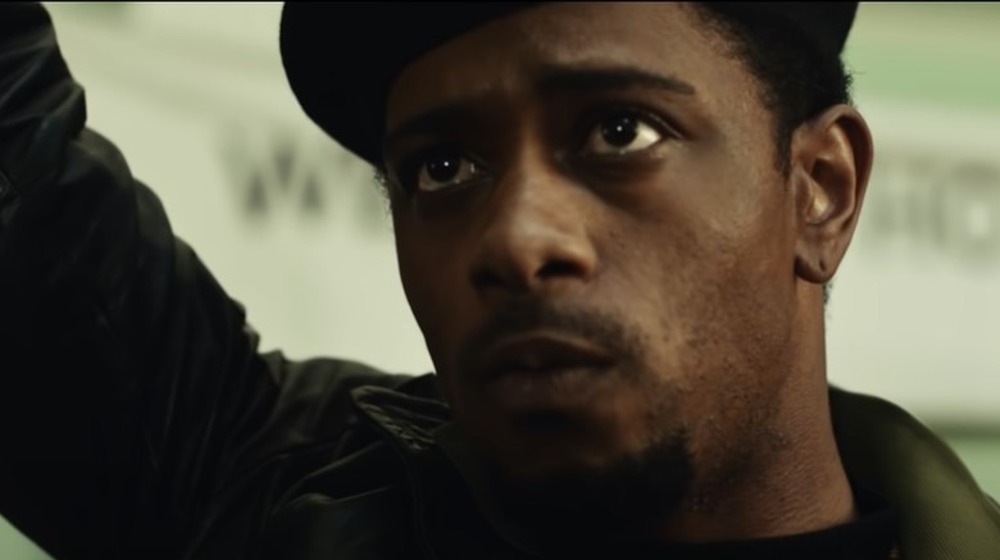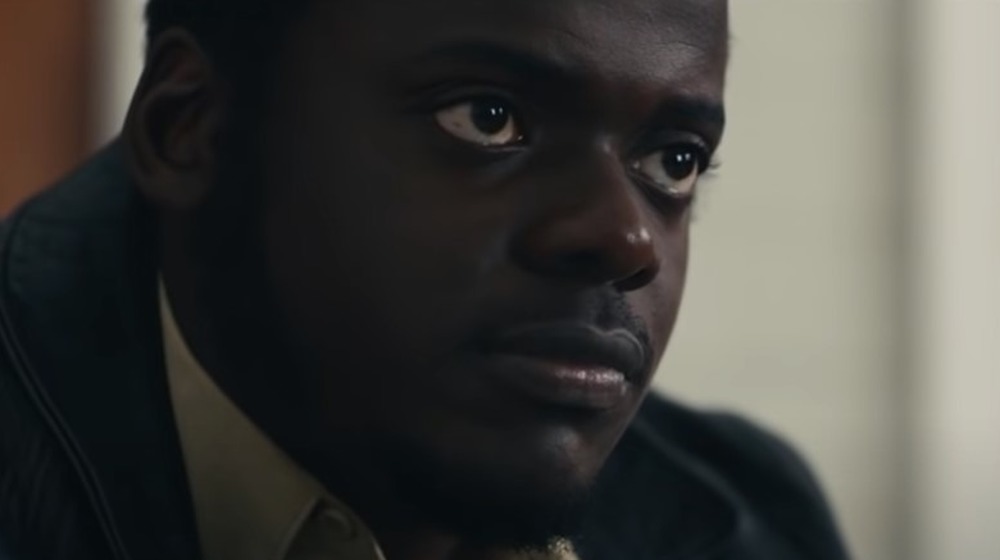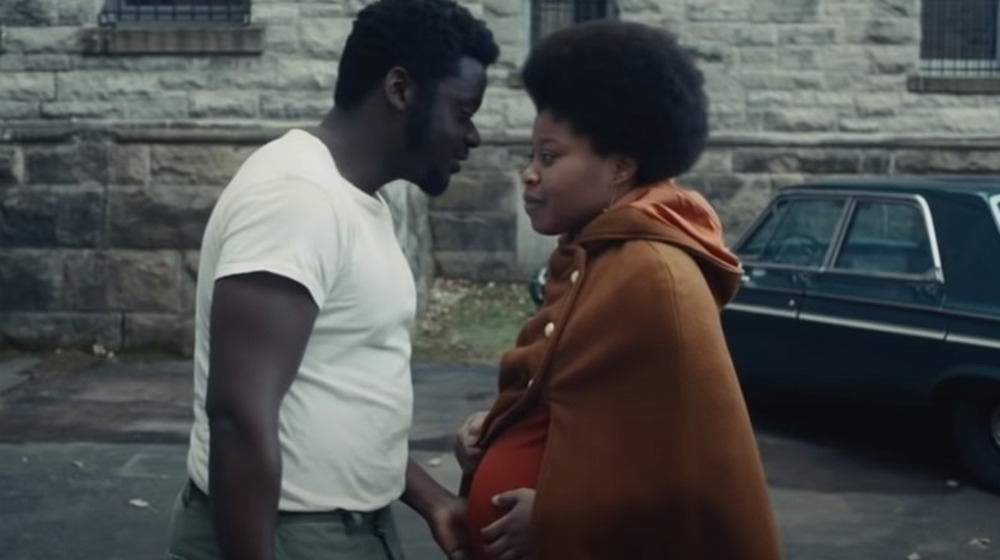The Ending Of Judas And The Black Messiah Explained
Judas and the Black Messiah recently premiered in theaters and on HBO Max. The much anticipated movie tells the story of an FBI informant's infiltration of the Chicago chapter of the Black Panther Party. The information from the informant ultimately led to the murder of one of the party's leaders, Fred Hampton. Audiences are taken on a dual journey where the inner turmoil of a misguided crook, and a frustrated leader, overlap with the civil unrest of the 1960s.
Though the main characters are portrayed by much older actors, in real life they were all just in their late teens when the events of the movie took place. The movie masterfully shows the strength of Hampton's endurance of the political climate, as he navigated personal struggles. Talking to the New York Times, co-producer Ryan Coogler said, "I felt that if we could thread both needles — the entertainment and the politics — then it would be very hard for people to dismiss the content of this movie."
Judas
Known for a pretty versatile acting career, LaKeith Stanfield has charmed audiences in The Photograph, and hilariously confused them on FX's Atlanta. In Judas and the Black Messiah he plays William O'Neal — the Judas in the title — a petty thief that avoids prison time by agreeing to infiltrate the Black Panther Party for the FBI.
In the movie, O'Neal confesses to his Black Panther comrades that he pretended to be an FBI agent, because that role carries power. In real life, O'Neal respected and admired the police, so he felt good about working for the FBI (via Newsweek). In the movie, O'Neal enjoyed the fruits of his bad deeds. His FBI handler paid him well, gave him nice cars, and allowed him to dine at fancy restaurants. Over time the sense of family O'Neal felt from the FBI mirrored the familial bond he was building with the Panthers, and he became very conflicted. The fatal consequences of his double-cross plagued O'Neal for years after he was put in witness protection, in California.
Glimpses of his guilty conscience play out in the movie through nightmares he has about the revelation that he's a rat, and an anxious exchange with another informant. For all of his bad deeds, his FBI handler gave him his final payment and the keys to a gas station business. In 1989, O'Neal sat for an interview for the PBS documentary Eyes on the Prize II: America at the Racial Crossroads 1965-1985. This is the only interview he ever gave where he talked about his role in Hampton's murder. The same day the documentary premiered, O'Neal committed suicide.
The Black Messiah
British actor and Get Out star, Daniel Kaluuya, plays Black Panther Party leader Fred Hampton.
Early in the film J. Edgar Hoover (Martin Sheen) speaks before a dimly lit auditorium of agents, with Hampton's picture plastered on the big screen behind him. He urges the agents to go after Hampton with full force before he becomes a "Black Messiah." Even at such a young age, Hampton's popularity was growing in the black community, and he worked to spread his message of freedom from police brutality to other poor communities, and communities of color. In one pivotal scene Hampton engages the Young Patriots Organization, a leftist group of white citizens who felt marginalized because of a lack of jobs. He created a collective known as the "rainbow coalition" (via Oxygen) to bring together all of these marginalized groups.
On a recent episode of The Daily Social Distancing Show, Kaluuya said learning about Hampton's life allowed him to grow as a man and an actor. The film also shows a side of Hampton outside of his activism: He falls in love with Deborah Johnson (Dominique Fishback), a young woman who approaches him after one of his fiery speeches. Hampton spent time in prison on trumped up charges the FBI hoped would weaken his image and the foundation of his organization, but he was released to an enthusiastic group of comrades who were ready to get back to the work Hampton had started.
In December 1969, O'Neal's information to the FBI led to an illegal raid of Hampton's apartment, where he was murdered in his sleep. The end of the film explicitly shows the details of this tragic night, the real footage of Hampton's memorial service, and the impact of his loss on the community.
The Legacy of Hampton's activism
From the late 1950s to early 1970s the FBI conducted an illegal counterintelligence program, coined COINTELPRO, that targeted many leaders of the civil rights movement. The bureau used covert tactics to discredit organizations deemed subversive, and eliminate leadership. Civil rights leaders and their families were subjected to constant harassment, illegal recordings of their conversations in the home, and over the phone, and the distribution of phony propaganda to the community.
Hampton was among many leaders the bureau targeted, who met a fatal end, but the program couldn't kill the message these leaders left with the people they advocated for. He was also among many Black Panther Party leaders who contemplated fleeing the country, as the legal heat surmounted. On the fatal night depicted in one the movie's final scenes, Hampton's comrades are plotting his escape with Deborah. He's given an envelope of money, and the suggestions of Cuba and Algeria are floated around. However, Hampton chooses to stay with his people, and continue fighting for the community.
Hampton's love, who now goes by Akua Njeri, was engaged to the leader, and nine months pregnant with their son when she witnessed his murder. Fred Hampton Jr. was born not long after, and the two continue Hampton's work through giving programs, revolutionary organizations, and speaking engagements.



